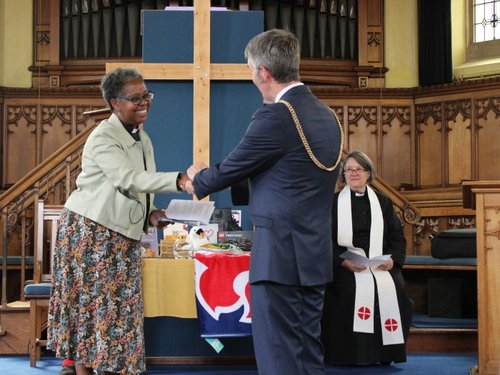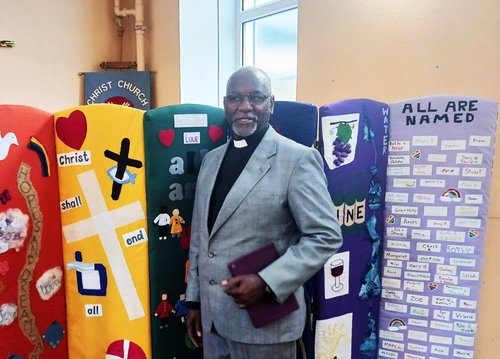To mark Black History Month, two Black District Chairs share their experiences and thoughts on Black leadership in the Church.
The Revd Sonia Hicks is a British Methodist minister who was elected to serve as President of the Methodist Conference from June 2021 to June 2022. She is Chair of the Northampton Methodist District.

Earlier this year, I sat in the Warden and District Chairs meeting and marvelled at a transformation that was happening in the Senior Leadership of the Methodist Church in Britain. There were five people who might define themselves as ‘Black’: Black British, Black African, Black Afro-Caribbean. We were different, our journeys were not the same, but we understood what it takes to be a Black senior leader and why other Black people, in the Methodist Church, could see it as too difficult; too costly; too painful.
My journey to this point was not one I would have chosen. Even though I could see the struggles that Black people often face, I wanted a ‘quiet life’. I wanted to not be at the forefront of changing this Methodist Church. Yet, God had a different perspective. I can see, as I look back, how many people pushed and challenged me to step up and step out. Friends and colleagues would ask me “Why not?” when I said that the next stage of leadership was not for me. I doubted whether I could be a Superintendent in Britain even though I had fulfilled that role in Jamaica and Ireland. I scoffed at the idea of being President. Who was I to preside at Conference and inspire Methodist people after the Covid pandemic? I laughed at the suggestion that the gifts and graces in me were the ones needed to be the Chair of the Northampton District. I am reminded of Sarai laughing at the promise of a child in her old age, but God always has the last laugh.
My Great Aunt Lize was asked to leave a Methodist Church on her very first Sunday in this country. Now, I, her great-niece, am tasked with helping this Church to learn from such mistakes and to welcome all who seek to belong. Can you hear God laughing? I can! And as God laughs, I meet Black Methodist people breathing a sigh of relief that someone who looks like them, who shares their experience in this society of being seen as a ‘foreigner’ is accepted as having the gifts for Senior Leadership. And they are quietly asking themselves: “If God can use Sonia, can God also use me to build up this Church?”
I believe that this Methodist Church, as it seeks to be a voice for those with no voice in society, needs to hear the voices of those already in its midst. The people who sit on the back pew of our churches and then head for the door as soon as worship ends. The people who when they share their experiences feel silenced. The people who, like me, think they have nothing to offer even though God has blessed them greatly. I pray that my being a District Chair reminds the whole Church that there are many ‘Sonias’ in our midst who need to be encouraged to take up leadership, to leave the back pew and take their place at the table because the call to serve God’s Church has no colour bar.
The Revd Dr Sonia Hicks
District Chair, Northampton
The Revd Dr Marcus Torchon is Chair of the Bristol District. He is passionate about the Church’s prayer life and evangelism. He believes that evangelism begins and ends with prayer. He is married to Sylvia, and they have one son.

Normative traditions and lived experiences in the Church have established, over the years, the benchmark for proto-typical leadership in an understandably dominantly white Church. It limits the possibilities that Black people, regardless of their specialisms, may be perceived as suitable holders of leadership roles not least as District Chairs. However, the apparent rise in Black leadership at this level signposts the ever-evolving commitment of the Church to gradually reject normative discriminatory traditions. With much reason for celebration, this means that, the Church is accommodating diversity and equality as Christ’s transforming work.
The District Chair role I am currently holding is no longer consecrated for, and expectedly defined by, a privileged ethnicity and race. However, being a District Chair as a Black person does not make the role Black because whiteness can be an institutional situation. Nothing substantial happens to it except that successful institutional conformity has to happen to me to be in the role.
Black leaders must shift back and forth between attenuating their power as they lead in a white context and having enough power to materialise a paradigm shift in the Church that is getting smaller. The knowledge that people who are marginalized have to be better, have to offer twice more, than their privileged counterparts, to even be perceived as suitable office holders, is well established. Black leaders carry the weight of the expectation of the Black community of believers as their tenure follows the pathway paved by past and present believers and impacts future generations of Black Chairs. Even so, a core part of our challenge is to manage the positive affect which we experience for being at this level of leadership in which we pledge to imitate Christ.
The Church is in a spectrum of positive change, re-calibrating its mission and ministry to serve this present age. Resulting from this, the good news is, to become a Chair has its claim on merit which a panel assesses. It means that Church members of the ethnic minority can elect to test the diversity and equality work of the Church in panel interviews for any role in the Church. In this way, gratefully, Black leadership is one strand of incarnational mission that inhabits the ever-changing culture of the Methodist Church. Together with other strands we may attain to the heights of love, demonstrated in our Saviour’s sacrifice.
Being a Black Chair is therefore about being one of solidarity with those who have to face normative discriminatory traditions. It nurtures the height of their expectations that any member in good standing can indiscriminately be a District Chair in as much they are called of God to this role.
This approach of the Church to accommodate diversity and equality as Christ’s transforming work emboldens an underlying desire to see everyone in the Church, regardless of their race, ethnicity, and gender, flourish.
The Revd Dr Marcus Torchon
District Chair of the Bristol District
The Church, Slavery and Reparations
After the Flood
Starting in Black History Month, Methodist churches are invited to show the film After the Flood: the Church, Slavery and Reparations and begin a conversation about responding to the lasting damage caused by the transatlantic traffic in enslaved Africans.
Organise a free showing of the film and send in your response.